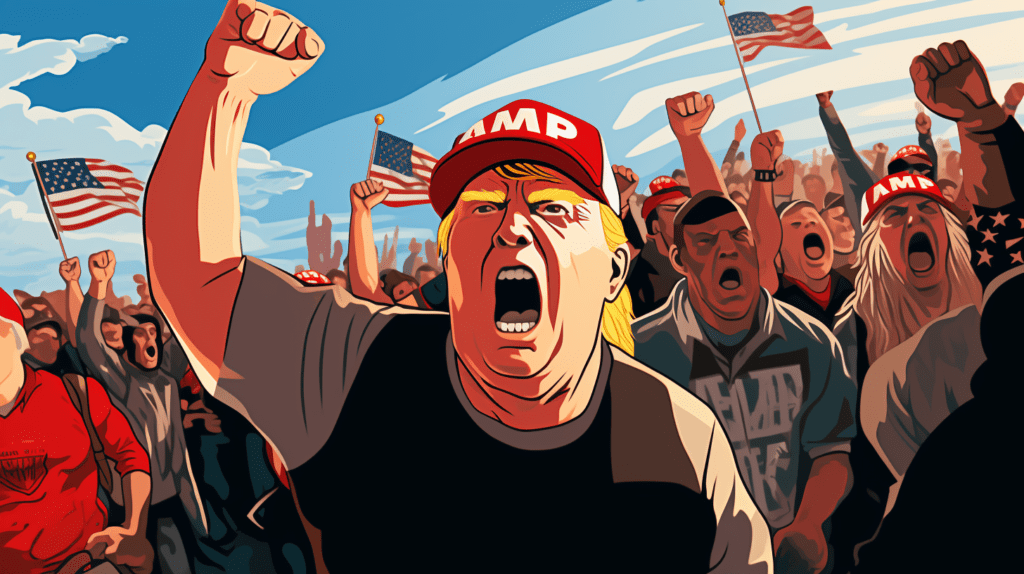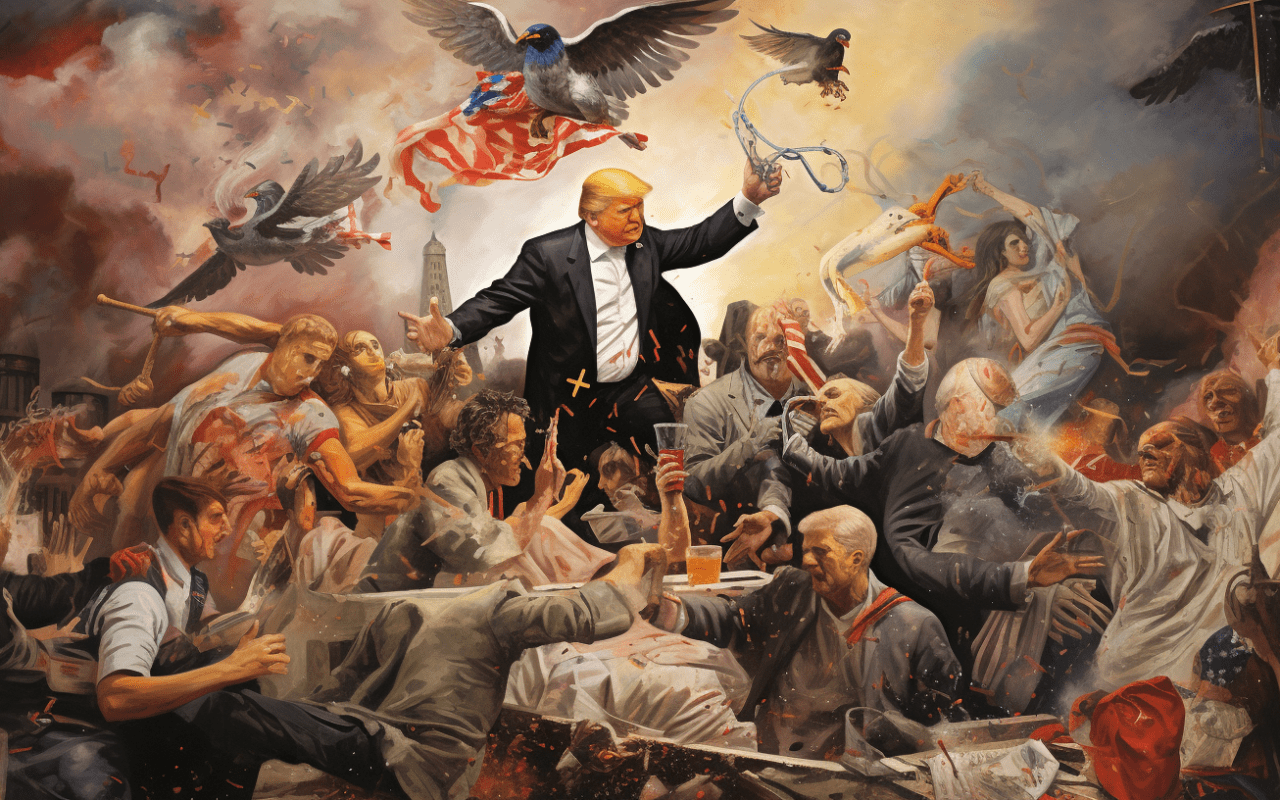Pathocracy is a relatively lesser-known concept in political science and psychology, which refers to a system of government in which individuals with personality disorders, particularly those who exhibit psychopathic, narcissistic, and similar traits (i.e. the “evil of Cluster B“), hold significant power. This term was first introduced by Polish psychiatrist Andrzej Łobaczewski in his work “Political Ponerology: A Science on the Nature of Evil Adjusted for Political Purposes.”
The crux of pathocracy lies in the rule by a small pathological minority, which imposes a regime that is damaging to the majority of non-pathological people. The key characteristics of pathocratic leadership include a lack of empathy, a disregard for the rule of law, manipulation, authoritarianism, and often, brutal repression.
Origins and development of the concept of pathocracy
Pathocracy emerges from Łobaczewski’s study of totalitarian regimes, particularly those of Nazi Germany under Adolf Hitler and Communism in the Soviet Union under Joseph Stalin. Born in Poland in 1921, he witnessed the upheaval and transformation of his own country during the horrors of World War II and subsequent Communist occupation.
He suffered greatly to arrive at the insights in his work — arrested and tortured by the Polish authorities under Communist rule, he was unable to publish his magnum opus, the book Political Ponerology, until he escaped to the United States during the 1980s. Łobaczewski spent the rest of his life and career trying to unpack what had happened to him, his community, and his nation — such brutality over such a shockingly short span of time.
Łobaczewski posits that these authoritarian and fascist regimes were not merely politically oppressive, but were also psychologically abnormal. He studied the characteristics of these leaders and their closest supporters, identifying patterns that aligned with known personality disorders. His work also identified a much higher percentage of personality disordered individuals than is still commonly understood, finding that about 7% of the general population could be categorized as severely lacking in empathy and possessing the tendencies — latent or overt — leading to the rise of pathocracy in society.
Characteristics of pathocratic leadership
- Psychopathy: Leaders in a pathocracy often display traits synonymous with psychopathy, including a lack of empathy, remorse, and shallow emotions.
- Narcissism: Excessive self-love and a strong sense of entitlement often drive pathocratic rulers.
- Manipulation: These leaders are adept at manipulation, using deceit and coercion to maintain their power. They also often exhibit other traits and behaviors of emotional predators.
- Paranoia: A heightened sense of persecution or conspiracy is common, leading to oppressive and authoritarian measures.
- Corruption: Moral depravity, ethical degeneration, and widespread corruption are endemic in a pathocracy, as pathological leaders tend to surround themselves with similarly affected individuals who feel no shame about performing unethical and/or illegal actions either in secret, or in broad daylight with little fear of retaliation.
Impact of pathocracy on society
The impact of pathocracy on a society is typically profound and deeply damaging. It leads to:
- Suppression of dissent: Free speech and political opposition are often brutally suppressed.
- Erosion of trust and moral values: As pathological behaviors become normalized, societal trust and moral standards deteriorate.
- Human rights violations: Pathocracies are marked by significant human rights abuses.
- Economic and social decline: Mismanagement and corruption often lead to economic hardship and further social unrest, in a kind of downward spiral of incivility and worse.

Psychological and social dynamics
Pathocracies perpetuate themselves by creating a climate of fear and submission. The majority, who are not pathological, are forced into compliance either through direct repression or by internalizing the pathocratic norms. This can lead to a collective trauma, with long-term psychological impacts on society.
Once in power, the psychologically disordered leadership creates a hierarchy where individuals with similar disorders or those willing to adopt unethical behaviors are placed in positions of authority. This system ensures loyalty and compliance, as those within the hierarchy are often rewarded for their unscrupulous actions.
The role of propaganda and control
Propaganda is a key tool in a pathocratic regime. It is used to manipulate public opinion, rewrite history, and present a grand myth of the pathological leadership as benevolent and necessary. The control of information is critical in maintaining the facade of legitimacy, and the manipulation of truth creates a distorted reality where the pathological nature of the leadership is obscured.
Typically, censorship and the creation of a police state enable a culture of surveillance and fear that are used to maintain control. Individual rights and freedoms are significantly curtailed, and the rule of law is manipulated to serve the interests of the ruling elite.
Challenges in identifying and combating pathocracy
Identifying a pathocracy can be challenging, as these regimes often masquerade as legitimate governments. International response is complicated by issues of sovereignty and the often covert nature of the pathology. Additionally, the appeal to nationalism and fear-mongering can make it difficult for the global community to intervene effectively.
The resistance to and overthrow of a pathocracy is usually tumultuous. It requires a significant awakening and mobilization of the oppressed majority. This often occurs only after prolonged suffering and when the regime’s unsustainable practices lead to crises.
The Trump pathocracy
The years of the Trump presidency exhibited many of the characteristics of a pathocracy — and there is every reason to believe that a potential second term (whether by actual or fabricated victory) could offer unfettered descent into even worse territory. Some of the most notable similarities include:
- Charismatic leadership: Donald Trump‘s leadership style was often characterized by a strong personal charisma and a direct, often confrontational communication style. His ability to connect with and energize an extremely loyal segment of the population is similar to the charismatic leadership often found in pathocracies — which in turn is similar to the hold that cult leaders tend to have on their followers.
- Polarizing rhetoric and us-vs-them mentality: The Trump administration was known for its polarizing rhetoric. The frequent use of divisive language and the promotion of an “us-versus-them” mentality can be seen as aligning with pathocratic tendencies to consolidate power by dividing and ruling.
- Authoritarian tendencies: Critics of the Trump administration often accused it of authoritarian tendencies, such as challenging democratic norms, attacking the media, and exhibiting a disregard for checks and balances. These behaviors can be interpreted as similar to those in a pathocracy, where power is centralized and dissent is suppressed.
- Manipulating truth and use of propaganda: The Trump administration faced allegations of disseminating misinformation, disinformation, and employing propaganda tactics, particularly in its use of social media and public statements. In pathocracies, controlling the narrative and manipulating truth are common strategies.
- Loyalty tests and purging of dissent: There were instances where loyalty to Trump was a significant factor in appointments and dismissals within his administration — particularly towards the end of his presidency, when numerous unqualified underlings were rapidly promoted to “Acting” high positions in order to carry out Trump’s bidding during the January 6, 2021 coup attempt and riots at the Capitol. This practice can be seen as reminiscent of pathocratic systems, where loyalty to the leader is prioritized over competence or ethical considerations.
- Questioning of ethical and legal norms: The Trump administration faced numerous legal and ethical challenges, including impeachment inquiries and controversies over business interests and conflicts of interest. Such challenges to legal and ethical norms can be seen in systems where the rule of law is subordinate to the interests of the ruling elite.
- Resistance and polarization: The high level of resistance and polarization during Trump’s presidency, including widespread protests and a highly contentious political climate, can be seen as indicative of a society reacting to what some perceive as pathocratic tendencies.

Caveat, voter
Pathocracy is a complex and deeply disturbing form of governance where pathological personalities dominate, leading to widespread suffering and societal degradation. We have seen the catastrophic destruction resulting from past pathocratic regimes, from political violence, loss of freedom, and instability to genocide.
The 2024 election cycle is shaping up to be a referendum on not just who we want to be governed by, but what system we want to be governed by — whether we will continue the dogged work of keeping democracy, or whether we will give in to the confoundingly seductive lure of psychopathic fascination. We should do whatever it takes to avoid the further descent into pathocracy — for our own sake, and for the sake of the next generation.

Comments are closed.